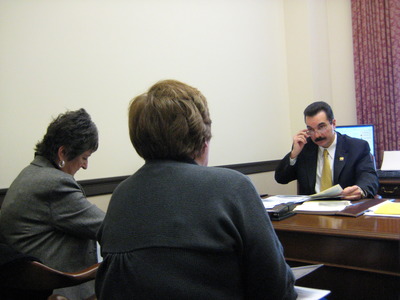With the state facing a $1 billion budget gap and a new governor, Secaucus may have lost its last chance to end its participation in a Meadowlands tax-sharing formula that local officials say has been a burden on the town for years.
Secaucus is among eight Meadowlands towns that contribute money to the state for the benefit of six other municipalities in the Meadowlands District. This tax-sharing formula was put in place to compensate towns that were historically barred by the state from having lucrative development. Towns that were allowed by the state to have lucrative develop paid the compensation fee to the other municipalities.
Since the 1960s, some municipalities in the Meadowlands District have been zoned for uses that do not generate much tax revenue – such as parks – while others, like Secaucus, were zoned for office space, which can generate a lot of revenue. State legislators believed it was necessary to spread the financial benefits of development evenly throughout the Meadowlands District and developed the tax-sharing formula as a way to do that.
Secaucus taxpayers currently contribute $3.2 million annually to the Meadowlands tax-sharing formula.
________
North Bergen, Carlstadt, Lyndhurst, Moonachie, East Rutherford, Little Ferry, and South Hackensack are the other seven municipalities that contribute.
Jersey City, Kearny, East Rutherford, North Arlington, Ridgefield, and Teterboro are the towns that receive money. In total, $7 million is transferred to the six receiving communities.
“Towns like Secaucus were allowed to develop, and we get revenue and ratables because of that,” said Assemblyman Vincent Prieto (D-32nd Dist.) “But that development wasn’t without a price tag.”
Prieto, a Secaucus resident, said the town has had to increase municipal services to accommodate its new development.
“In Secaucus, there were a lot of private roads that were built as a part of these developments that the town eventually had to take over,” Prieto said. “And once we took them over, we discovered they needed repairs and other work. So, again, that’s another expense that we’ve had to absorb as a result of the commercial development we have here.”
Because of the burden, Prieto has tried since 2005 to change the formula. As recently as last summer, Elwell and others in his administration believed Prieto’s efforts would prove successful.
But the election of Chris Christie as governor and the looming state deficit now threaten to upend Prieto’s work on this issue.
Roots of tax-sharing
As one of 14 towns included in the Meadowlands District, Secaucus comes under the jurisdiction of the New Jersey Meadowlands Commission (NJMC), a state agency founded to plan and oversee regional development in the Meadowlands.
According to an NJMC spokesman, “The tax-sharing program was established in 1972 to create a fair and equitable method of distributing the benefits and costs of economic development and land use decisions made by the NJMC amongst the 14 Meadowlands District municipalities [under its jurisdiction].”
Although the NJMC serves as a conduit for the money collected, the agency does not keep the money. Instead the money is distributed to the eight receiving communities.
Tax-sharing replaced
“The municipalities that receive money should continue to receive,” Prieto said last week. “I recognize that they have been impacted by the type of development they’ve been allowed to have.”
Under his bill, he would find another way to give $7 million in state money to the eight municipalities that currently receive money through the Meadowlands tax-sharing formula.
Initially, Prieto tried to generate this money by raising the state’s realty transfer fee, a fee that homebuyers pay to the state for residential property purchased for more than $1 million. Currently the fee is 1 percent of the home sale price.
More recently, he has suggested adding a surcharge to certain attractions at Xanadu, the proposed sports/entertainment/retail development on Route 3 in East Rutherford.
“It’s difficult, because Christie has said he doesn’t want any new taxes,” Prieto said. “So, we’ll have to see how receptive he is to these options, or other options.”
Although the lame duck administration of Gov. Jon Corzine is in its last weeks in office, Prieto said he continues to lobby this issue and held meetings with the Corzine administration after the Nov. 3 elections.
E-mail E. Assata Wright at awright@hudsonreporter.com.
